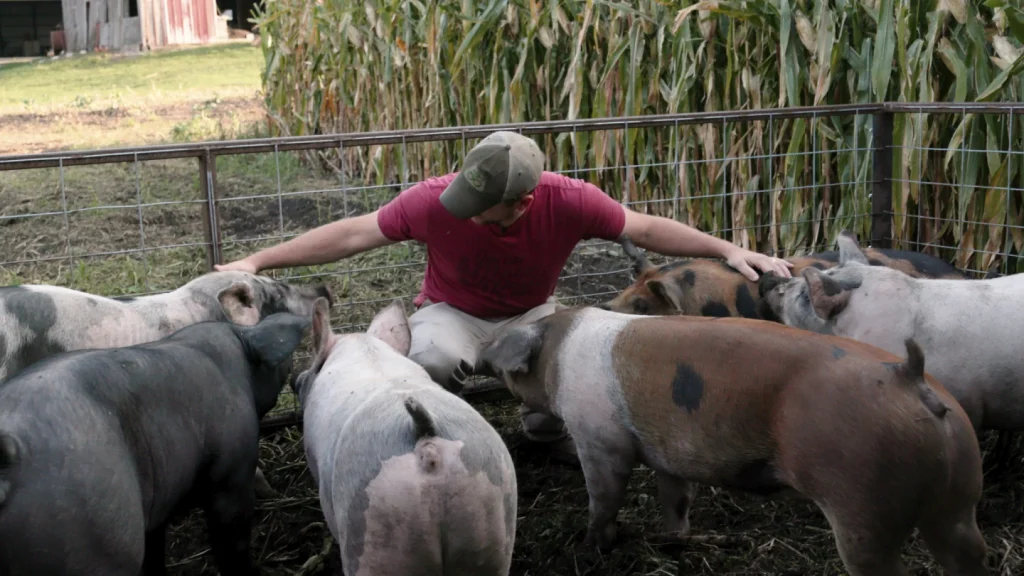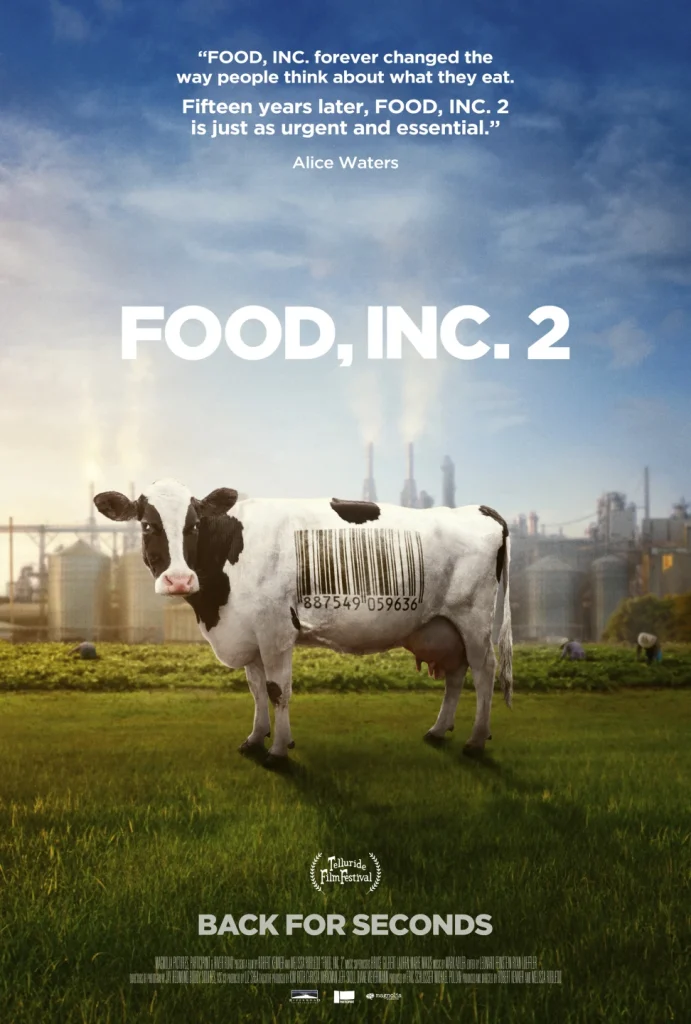In the realm of documentary filmmaking, few works have had the profound impact and lasting relevance of the Oscar-nominated documentary “Food, Inc.”
This groundbreaking film, released 16 years ago, provided a stark and eye-opening look into the intricate and often opaque systems that govern the production and distribution of the food we consume on a daily basis.
By shedding light on the hidden realities of the food industry, “Food, Inc.” succeeded in prompting a paradigm shift in the way many consumers view the origins and implications of their dietary choices.
However, as time has passed and new challenges have emerged, the issues highlighted in the original documentary have not only persisted but in many cases worsened, exacerbated by the disruptions and shortages brought about by the ongoing global pandemic.
It is against this backdrop of heightened awareness and urgency that the eagerly awaited sequel, “Food, Inc 2,” is set to make its debut in theaters and on digital platforms this coming April.
Taking a bold and proactive stance, the filmmakers behind “Food, Inc 2” are not content with merely shining a light on the problems plaguing our food systems.
In collaboration with the activist media company Participant, as well as producers River Road and Magnolia Pictures, a comprehensive and multi-faceted campaign is being launched to raise awareness and advocate for crucial issues such as farm workers’ rights, corporate consolidation, and the proliferation of ultra-processed foods.
This ambitious campaign, unveiled in a recent announcement, has garnered the support and partnership of several key organizations dedicated to combating the systemic issues at the heart of the food industry.
Among these partners are The Open Markets Institute, a non-profit organization committed to exposing the dangers of monopolization through rigorous research and investigative journalism;
The Coalition of Immokalee Workers, a grassroots movement fighting for the rights and fair treatment of farmworkers; and FoodFight USA, a nonpartisan initiative spearheaded by entrepreneurs Todd Wagner and Lori McCreary, aimed at reforming the American food supply by reducing the prevalence of ultra-processed foods, which currently make up a staggering 70% of the market.
The urgency of addressing these pressing concerns is underscored by recent legislative actions, such as the landmark decision by California to ban four harmful chemicals commonly found in processed foods and beverages sold within the state by the year 2027.
These chemicals, including red dye no. 3, potassium bromate, brominated vegetable oil, and propyl paraben, have been linked to serious health risks, including cancer, and yet continue to be used in popular products such as Peeps, the iconic marshmallow chicks synonymous with the Easter season.
The ban represents a significant step towards safeguarding public health and holding the food industry accountable for the ingredients and practices that impact consumers’ well-being.
In conclusion, the forthcoming release of “Food, Inc 2” and the accompanying advocacy campaign signal a renewed commitment to addressing the complex and far-reaching issues embedded within our food systems.

By amplifying the voices of those affected by corporate greed, exploitation, and harmful practices, this documentary and its associated initiatives strive to inspire meaningful change, empower consumers to make informed choices, and ultimately pave the way towards a more sustainable and equitable food landscape for all.
In recent years, the issue of food safety has garnered increasing attention from both policymakers and the general public.
The passage of the California Food Safety Act, along with the subsequent introduction of similar bills in five additional states, has underscored the urgent need for reform in the regulation of the U.S. food supply.
As highlighted by Wagner’s statement, the growing recognition of the presence of banned chemicals in American food products has sparked a national conversation about the safety and quality of the food we consume on a daily basis.
The enactment of the California Food Safety Act represents a significant milestone in the ongoing efforts to ensure the safety and integrity of the food supply chain.
By banning four chemicals that are already prohibited in foods in the European Union, California has taken a proactive stance in protecting the health and well-being of its residents.
This legislation serves as a model for other states seeking to address similar concerns regarding the presence of harmful substances in the food supply.
The implications of the California Food Safety Act extend far beyond the borders of the state itself. The introduction of similar bills in five additional states demonstrates a growing awareness of the need for comprehensive food safety regulations at the national level.
As consumers become more informed about the potential risks associated with the consumption of certain chemicals in food products, there is a heightened demand for greater transparency and accountability in the food industry.
The statement by Wagner underscores the timeliness of the documentary that has shed light on the prevalence of banned chemicals in American food products.
The fact that these substances are prohibited in the European Union serves as a stark reminder of the disparities in food safety standards between different regions of the world.
As consumers become increasingly aware of these discrepancies, there is a growing push for harmonization of food safety regulations on a global scale.
The passage of the California Food Safety Act and the subsequent introduction of similar bills in other states signal a shift towards a more proactive approach to food safety regulation in the United States.
By aligning with international standards and banning chemicals that are deemed unsafe for consumption, states are taking a crucial step towards safeguarding the health of their populations.
This movement towards stricter food safety regulations reflects a broader trend towards greater accountability and responsibility within the food industry.
In conclusion, the enactment of the California Food Safety Act and the introduction of similar legislation in other states mark a significant turning point in the ongoing efforts to enhance food safety standards in the United States.
As consumers become more informed about the potential risks associated with certain chemicals in food products, there is a growing demand for stricter regulations and greater oversight of the food supply chain.
The timeliness of the documentary referenced by Wagner serves as a poignant reminder of the urgent need for reform in the food industry.
By working towards harmonization of food safety standards and banning harmful chemicals, states can ensure a safer and more transparent food supply for all Americans.
David Linde, the CEO of Participant, has emphasized the significant impact of the company’s campaign for the first “Food, Inc” in supporting the enactment of the Food Safety Modernization Act, the first major piece of food safety legislation since the 1930s, signed into law by President Barack Obama in 2011.
Linde expressed pride in the company’s ongoing commitment to catalyzing change within the food industry.
The upcoming release of “Food, Inc 2,” directed by Robert Kenner and Melissa Robledo and produced by renowned figures Michael Pollan and Eric Schlosser, is highly anticipated.
Scheduled to premiere in select theaters on April 9, followed by its digital release on April 12, the film is poised to continue the important dialogue surrounding food production, safety, and sustainability.
Participant’s dedication to advocating for social and environmental issues through impactful storytelling is exemplified in its support of projects like “Food, Inc” and now its sequel.
By leveraging the power of film to raise awareness and inspire action, Participant plays a vital role in fostering positive change and shaping public discourse on critical issues.
The collaboration between talented filmmakers and industry experts in “Food, Inc 2” underscores the collective effort to shed light on the complexities of the food industry and empower audiences to make informed choices about the food they consume.
With a focus on transparency, accountability, and sustainable practices, the film aims to spark conversations and drive meaningful change within the food system.
As the release date approaches, anticipation builds for the impact that “Food, Inc 2” will have on audiences, policymakers, and industry stakeholders alike.
Through compelling storytelling and thought-provoking content, the film is poised to continue the legacy of its predecessor in challenging the status quo and advocating for a more sustainable and equitable food system.

In conclusion, the upcoming release of “Food, Inc 2” represents a significant milestone in Participant’s mission to drive positive change through film.
By engaging audiences, raising awareness, and amplifying important voices within the food industry, the film serves as a catalyst for meaningful dialogue and action.
As David Linde and the team at Participant continue their critical work of galvanizing change, “Food, Inc 2” stands as a testament to the power of storytelling in shaping a better future for food and society as a whole.

